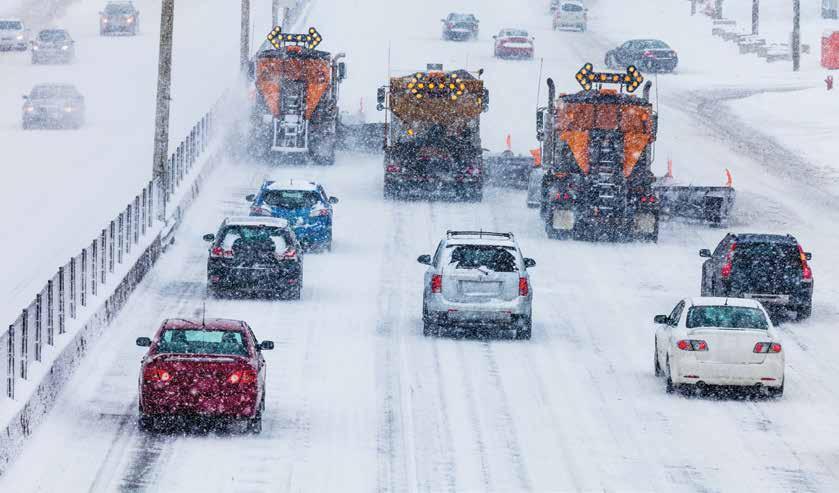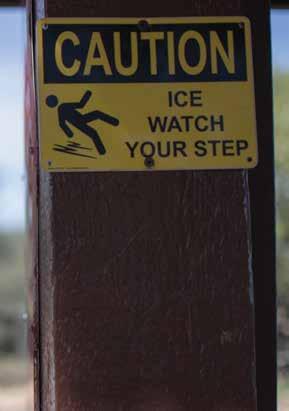
6 minute read
How we can help to reduce the costs of snow plow operations for the taxpayers
By Ted Butler
Once again, winter is upon us here in Canada, and along with the winter season comes the inevitable onslaught of cold temperatures, snowfalls, and freezing roads. The municipal public works departments in our towns and cities across Canada do an amazing job every year of keeping our roads as safe as possible.
Many municipalities across Canada have their own snowplowing equipment, yet some municipalities still contract out their plowing requirements to private snow removal companies. Regardless of which method your municipality uses to keep your local roads and sidewalks clear, it’s important to remember that it is an arduous and monumental task each and every winter. It requires a lot of well-trained people, as well as resources and money.
The annual tax dollars appropriated to the snow removal process is staggering. Consider for a moment all the resources and equipment required to keep your roads clear. You have all the plow trucks and heavy equipment, which are very expensive to purchase and operate. You have fuel costs and maintenance costs and repairs for the plows. You have highly trained (and well paid) staff to operate the plows. There are other costs involved also, such as stockpiles of sand and/or salt, and other de-icing or anti-icing chemicals to spread upon the roads. There are public works buildings required to house the staff and the equipment. Electricity for lights and heating, and many other costs associated with keeping our roads safe every winter.
Another major cost which is rapidly increasing every year is the insurance premiums, which are partially due to an increase in slip and fall litigations. Nowadays, in Canada, there are lawyers who actually specialize in slip and fall litigation. Some of their websites instruct fallen potential customers to ensure they take pictures of the scene and get any names and phone numbers of witnesses in order to ensure they have evidence for the court case. It begs the question of are these people who sue their municipalities for slipping and falling on public sidewalks the same people complaining about increases in municipal taxation? Don’t get me wrong, I’m sure there are some legitimate cases of extreme neglect of winter maintenance which has caused some legitimate injuries, and I do agree that those victims should be properly compensated for their suffering. That said, I do feel the compensation should precisely fit the consequence only. In other words, whatever the cost of the injury is for the victim, that is what they should receive. Hospital bills, prescriptions, time off work, etc., only. Nothing else. I just don’t think that a slip and fall situation should be an opportunity for victims and lawyers to fill their pockets with taxpayers’ hard-earned dollars. Remember, it’s always us taxpayers who must cover the bill. Whenever I see a plethora of lawyers specializing in slip and fall litigation, it tells me that they know there’s a lot of money in it. Taxpayers money.
Another very effective method to reducing snow plowing costs is to decrease salt usage on our streets. This method is also helpful for our environment. Western Canadian provinces generally use more sand and less salt on their roads mainly because salt is not effective at extremely low temperatures. Ontario municipalities generally use more salt than sand, especially in southern Ontario where the winter temperatures do not often get as low.
Salt statistics
Salt is the most commonly used deicing chemical and is a very effective tool, but it has its limitations such as…
If the pavement temperature is…
• -1°C, one pound of salt will melt around 40 pounds of ice.
• At -7°C, one pound of salt will only melt around eight pounds of ice.
• At -14 °C, salt will melt very little ice.
• At -15°C, salt becomes ineffective and other methods are recommended.
• At 3.8°C, salt will melt a thin layer of ice in about seven minutes.
• At 12.2 °C, salt will melt that same thin layer of ice in about an hour.
These facts lead most public works managers to consider limiting the application of salt when the pavement temperatures are in the range of -9.5°C to -6.5°C and falling. These figures can vary slightly depending upon which part of the country you live in (dry climates or moist climates).
Anti-icing agents are commonly used in areas where a higher level of service is needed. Anti-icing is applied as a liquid chemical to the pavement prior to the storms’ arrival. It is recommended to use in the range of 25 to 50 gallons per lane-mile. This amount of agent will remain on the road for many hours and possibly days.

Effective snow-removal operations require plenty of planning and constant training. Trained and seasoned snow plow operators are the key to efficient snow removal operations. Upgrades in equipment and appropriate use of new chemicals will help reduce operational cost budgets. Another costly issue within the private or contract snow plowing industry is price fixing. In 2017, the Competition Bureau of Canada (an independent law enforcement agency) announced to all the snow removal contractors that agreeing on pricing in any particular territory is illegal.
If a snow removal contractor approaches another competing snow removal contractor and offers to “share the workload” or “split routes” or agree on their pricing to offer to customers, it’s against the law. We must be wary of this type of arrangement. Snow removal contractors must understand that when they discuss these types of subjects with their regional competitors, they’re walking on thin ice (no pun intended). If you are in the snow removal business, remember it’s illegal to agree with nearby snow removal competitors regarding:
• The prices you are charging, including any increases and/or surcharges.
• The number of customers you will sign up.
In order to keep yourself and your business safe from any legal trouble, remember the following tips:
• Do not discuss business with competitors unless you are accompanied by a lawyer. • Decide your prices, price increases, and surcharges on your own.

• Explain the terms of your service contract to your customers.
• Report any suspicious activity to the competition bureau immediately through the Whistleblowing initiative, or by calling 1-800-3485358.
Many Canadian citizens feel that they are heavily taxed, as compared to other countries. We live in a huge country. Almost 8,000 kilometres across from the Atlantic to the Pacific and there are a lot of roads to maintain. There is a total of 1,042,300 kilometres (647,700 miles) of roads in Canada, of which 415,600 kilometres (258,200 miles) are paved, including 17,000 kilometres (11,000 miles) of expressways, the third-longest in the world. Therefore, snow plowing is definitely an essential service in Canada. It’s an annual task which must be done as efficiently as possible to the keep costs down for our taxpayers. Our municipal public works departments across Canada do an absolutely amazing job every year within very stringent budgets. Unfortunately, it’s just not physically possible to keep every square foot of roads and sidewalks 100 per cent clear at all times.
Let’s be careful out there. ■







